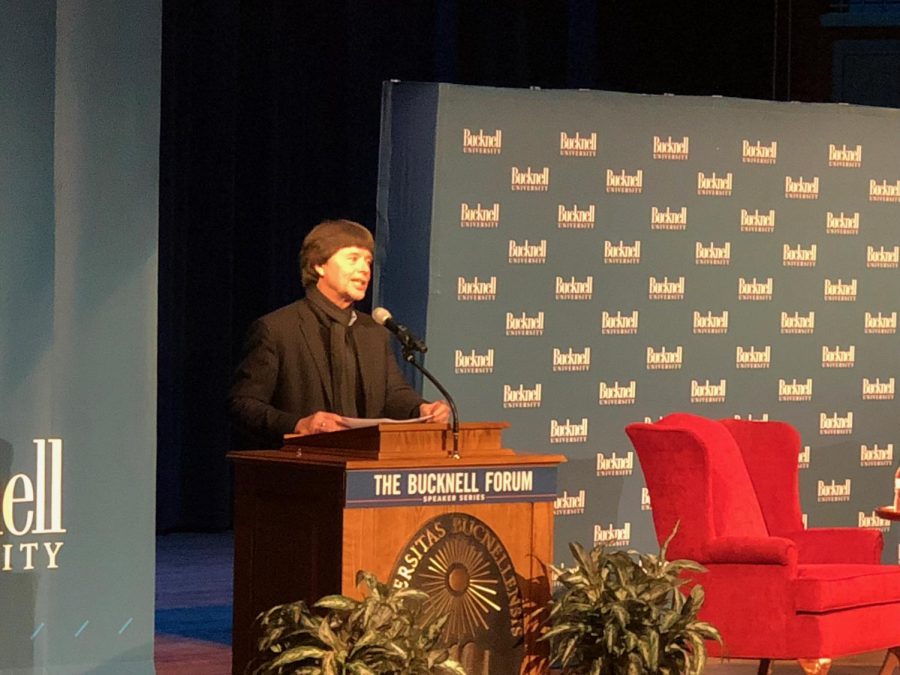Ken Burns speaks on “The Vietnam War” and other documentary successes
April 12, 2018
Filmmaker Ken Burns presented on his most recent 10-part, 18-hour series “The Vietnam War” at the Weis Center for Performing Arts on April 9 as part of the Bucknell Forum speaker series. Burns, considered the most acclaimed historical documentarian of our time, started with a 15-minute address and proceeded to answer questions from University President John Bravman and audience members.
“The Vietnam War” was a decade-long project of unearthing “photographs that have never seen the light of day,” from over a hundred archives in Hanoi, Ho Chi Mihn City, Beijing, and Moscow, Burns said. His team collected hundreds of hours of news footage, interviewed over 100 individuals directly involved in the war, and meticulously choose voiceovers and soundtracks for the series. Interviewees include North and South Vietnamese citizens, Viet-Cong, as well as American soldiers, nurses, reporters, Gold Star Mothers, and anti-war activists. Burns said making the film was an exploratory process which he sought to emulate for those watching the finished version. Most footage collected for the series came without sound. The addition of sound was an immense task for Burns and his team. Burns recounted firing M16s and AK-47s on his property in the New Hampshire woods, which he recorded to accompany the footage.
“Human nature never changes,” Burns said, referencing the idea that there are patterns in history. He quoted Mark Twain, “History doesn’t repeat itself, but it often rhymes.”
Parallels between now and the years of the Vietnam War that Burns mentioned include mass demonstrations, protesting the current administration, a disorderly White House obsessed with leaks, a president concerned that the press was lying about him and imparting fake news, asymmetrical warfare, a massive reveal of classified materials, and accusations of a political party reaching out to a foreign power to sway the presidential election.
According to Burns, after the Vietnam War, the military resolved to never let the press have the same unrestricted access it possessed in Vietnam and in subsequent wars. Journalists currently “embedded” in war-ridden countries face severe restrictions to what they see, Burns said.
“It reminds you watching the Vietnam film how central a free and unfettered press is to the conduct of our democracy and how incredibly difficult our current moment is,” Burns said. “We permit people who actually make up fake news to call other sources fake news […] When nothing is true what is there?”
Craig Silverman ’20 was surprised by the makeup of the audience. “The audience was mostly people from the community. I anticipated a lot more students being interested in hearing from such a well-regarded documentarian that Ken Burns is,” Silverman said. Silverman has not seen Burns’ most recent series, but said it was “fascinating to hear his adept knowledge of American history,” and about his 10-year filmmaking process.
“I am interested in listening to the voices of a true, honest, complicated past that is unafraid of controversy and tragedy, but equally… equally drawn to those voices, stories, moments, and memories that suggest an abiding faith in the human spirit,” Burns said. This has been his mantra over the past 40 years as a documentarian. Burns has a specific interest in the American nation’s role in the progress of history and believes the Vietnam War is the most important event in history since the Second World War.
Burns’ current film projects include an eight-part history of country music, the history of the American Revolution, the history of crime and punishment, as well as biographies on Ernest Hemingway, Muhammad Ali, Benjamin Franklin, and Lyndon B. Johnson.





















